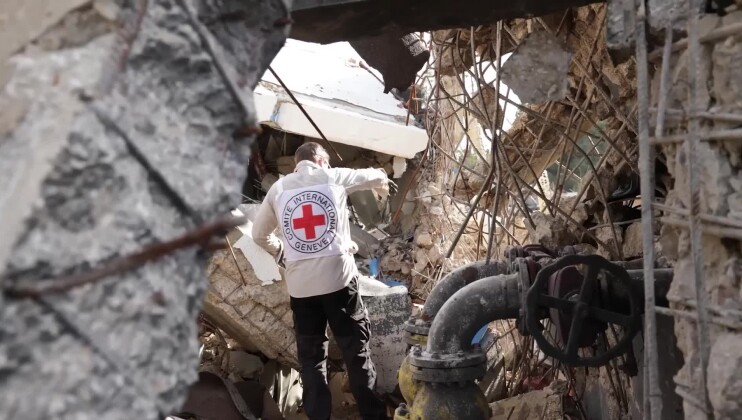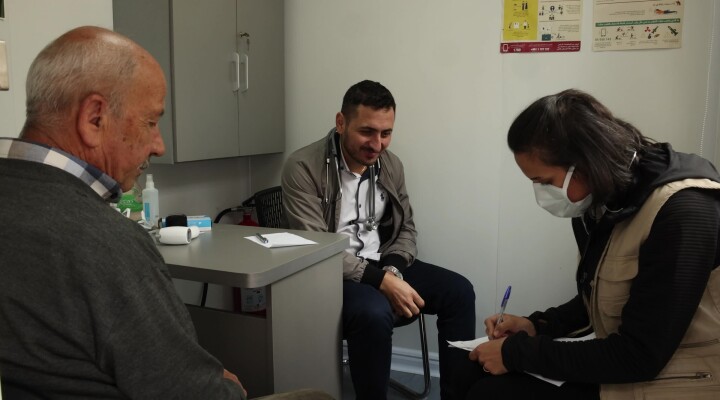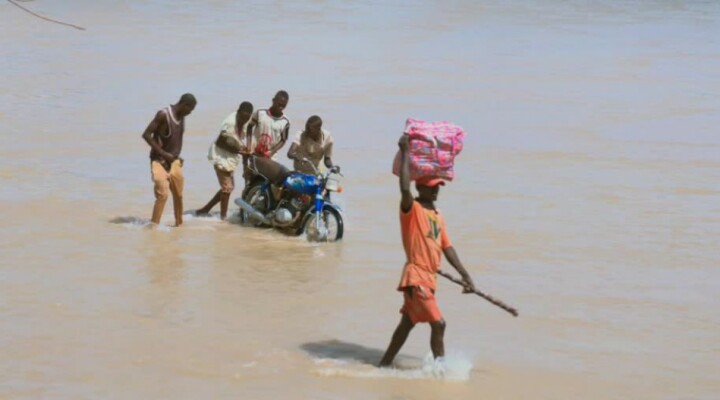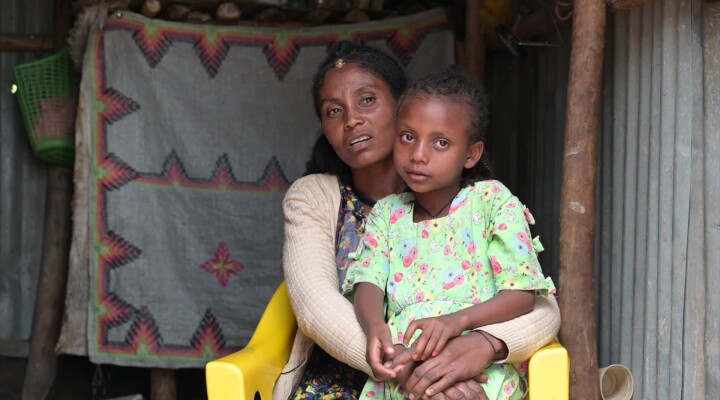Niger: For Many Migrants, The Journey Ends In Agadez
Until recently, tens of thousands of migrants were travelling through the city of Agadez – on the edge of the Ténéré desert – on their journey across the Sahel to Europe, in search of safety and security and a better life. Not any more. The dangers of the road, combined with ever tougher migration policies, in both Europe and Niger, have deterred many.
Agadez remains a transit city for many migrants expelled from neighbouring countries (particularly Algeria and Libya) who choose to start over here. Faced with an increasingly inaccessible North and unlikely to return home, some end up finding work and having a family, but their status as irregular migrants keeps them in a precarious, unstable situation.
“Unfortunately we cannot go further and we cannot go back because the road is now stressed,” explains Lamine, a Gambian who still hopes to carry on in order to help his family back home. He gets by doing odd jobs on construction sites. “Some people are in prison in Libya and even in Agadez. And the situation of the police for the immigrants is creating stress for us,” he says.
Ousmane, a migrant from Senegal, used to make a living in Agadez recruiting potential candidates for people smugglers. “Before, we had no problems. It was our job, our workplace. We didn’t have to hide, the police didn’t come after us. But that work is no longer an option. There are too many problems. We’re hounded. I have suffered here, I even went to prison twice.” For him, there is no question of returning to Senegal; his life is here now. He has married a Nigerien woman and works on construction sites.
Baboucar, an old friend of Ousmane’s, has lived in Agadez since 2013. He used to help migrants make travel arrangements. Like Ousmane, he decided to change his way of life when the situation changed, and now he lives with his family in Agadez, where he raises livestock. “We used to help drivers find people wanting to travel, but now that’s forbidden. We had to adapt and accept any work that came along to look after our families,” he says.
Since a law to tackle irregular immigration came into force, migrants have tried to avoid drawing attention to themselves, but as a result they need more humanitarian aid. The Red Cross (the International Committee of the Red Cross (ICRC), the Red Cross Society of Niger and the French Red Cross) is helping those most in need by providing basic health care. Since the beginning of the year, some 3,000 migrants have been treated by the French Red Cross, either in a health centre or during visits to the “ghettos” where the migrants live. Patients come with conditions linked to poor hygiene, respiratory infections and malaria or for prenatal check-ups. By way of comparison, 1,817 migrants were treated during the same period in 2017.
The stream of migrants travelling north has not dried up completely, however. Near the bus station, a mobile phone stand supported by the ICRC has been set up to enable migrants who have lost touch with their families to call them for free. Some 3,500 phone calls have been made since the beginning of the year. “They are allowed to make a two-minute phone call. Then we remind them of the importance of carrying water and above all of memorizing the telephone numbers of one or two family members during their journey,” explains Abdoul Razak Aliou, a volunteer with the Niger Red Cross.
For the International Red Cross and Red Crescent Movement, it is not about encouraging or discouraging migration, but a simple humanitarian effort to address the dire needs and uphold the dignity of those who have chosen this path.
SHOTLIST
Location: Agadez, Niger
Duration: 4 minutes, 58 seconds
Format: HD
Camera, production, editing: Birom Seck
Date: June 2018
Copyright: Rights-free
00:00–00:28 Some shots of the city.
00:28–00:40 Ousmane at home with his children and his friend Baboucar.
00:40–00:46 Ousmane: “This is where I relax.”
00:46–00:54 Ousmane talks to his wife whose house it is.
00:54–01:09 Ousmane and his wife talk:
Ousmane: “Everyone around here knows me. They call me Ousmane from Senegal.”
His wife: “Ousmane from Senegal, the husband of Lolua!”
01:09–01:18 Ousmane shows us round one of the construction sites where he works.
Ousmane: “We installed this gate.”
01:18–01:23 Ousmane: “This is how I earn a living.
I work on several sites but for the moment I’m working here.”
01:23–01:28 Ousmane uses his mobile phone.
01:28–01:44 Interview with Ousmane, former migrant smuggler
01:28–01:35 “Before, we had no problems. It was our job, our workplace. We didn’t have to hide, the police didn’t come after us.”
01:35–01:44 “But that work is no longer an option. There are too many problems. We’re hounded. I have suffered here, I even went to prison twice.”
01:44–02:07 Baboucar lives with his wife and daughter. He raises sheep and rabbits.
02:07–02:39 Interview with Baboucar, former procurer turned livestock farmer
02:07–02:31 “We used to help drivers find people wanting to travel, but now that’s forbidden. We had to adapt and accept any work that came along to look after our families.”
02:31–02:39 “No matter how long a tree trunk lies in the water, it will never turn into a crocodile. No matter how many years I spend here, I’m still a migrant.”
02:39–03:10 A Red Cross mobile clinic set up where the migrants live (3 shots).
Lamine has fever and pain.
03:02–03:06 Nurse: “Your temperature is 38.1 degrees. Don’t you have a mosquito net?”
Lamine: “No, I don’t.”
Nurse: “These are the symptoms of malaria. Four in the morning and four in the evening.”
03:10–03:43 Interview with Lamine, a Gambian migrant living in Agadez since 2015
03:10–03:16 “Unfortunately we cannot go further and we cannot go back because the road is now stressed.”
03:16–03:27 “Things are not easy. Some people are in prison in Libya and even in Agadez. And the situation of the police for the immigrants is creating stress for us.”
03:27–03:43 “Though some people lost their lives, some crossed. Everything depends on God. We know how hard the desert is. But even where I was born it’s hard for me because I can die there.”
03:43–04:00 Lamine washes his clothes.
04:00–04:15 3S.T.V bus station in Agadez – the Restoring Family Links mobile phone stand for migrants (4 shots)
04:15–04:33 Two migrants call their families (5 shots).
04:33–04:37 One migrant speaks to his family: “Hang in there, take care.”
04:37–04:58 Interview with Abdoul Razak Aliou, a Restoring Family Links volunteer with the Niger Red Cross
“They are allowed to make a two-minute phone call. Then we remind them of the importance of carrying water and above all of memorizing the telephone numbers of one or two family members during their journey.”
END
Download professional-quality footage from the ICRC Video Newsroom
www.icrcvideonewsroom.org
For further information, please contact:
Kadidia Abdou Djabarma, ICRC Niamey, tel: +227 92 199 196
Jean-Yves Clémenzo, ICRC Dakar, tel: + 221 78 639 86 29
Annick Bouvier, ICRC Geneva, tel: +41 79 244 64 05
Follow the ICRC on facebook.com/icrc and twitter.com/icrc



